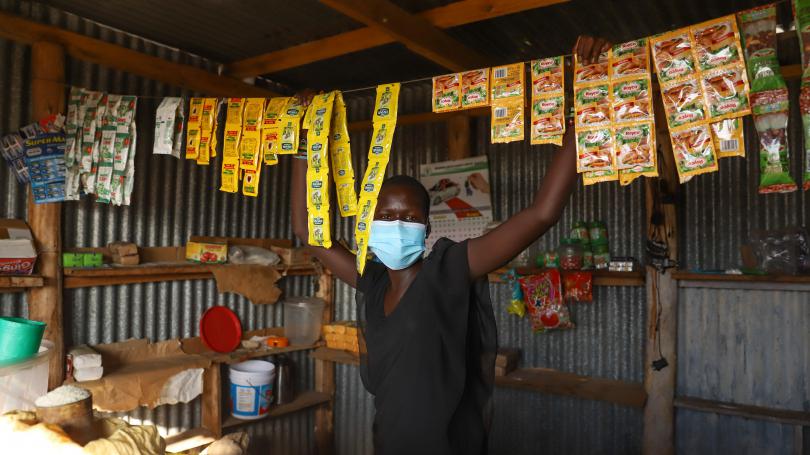‘I enjoyed learning on TV, it was as good as being in class’

By Delfhin Mugo
Lopeto, 13, is a bubbly and bright girl from a remote village in Turkana County. At a private boarding school located several kilometres from home where Lopeto goes to school, her record speaks volumes about her education prowess.
She is among the top students in Standard Five having scored 413 marks out of 500 in the last exam she did just before schools closed. During a Save the Children state-of-learning assessment and education content gathering exercise in Turkana North, she was quick to point out to the team that the lowest marks she ever scored was 394 out of a possible 500.
However, since March this year education for school going children like Lopeto has been disrupted by the Covid-19 pandemic, forcing governments and education partners to look for innovative ways to keep children engaged. In Kenya, for instance, the Ministry of Education stepped up to facilitate learning during the period that learners will be at home through radio, television, YouTube and Kenya Education Cloud.
But in remote villages in arid Turkana County where poverty levels are among the highest in the country, the latter two are completely out of reach and only a few families can afford a television set and electricity to power it.
Lopeto is one of the lucky pupils whose homes have a TV. By Turkana standards her family would be considered a bit well off. Her father, a security guard at a nearby health facility, owns a small shop which is run by his wife. This shop, he says, supplements his income and is therefore able to feed and sustain his family.

When Covid-19 hit the country and more than 16 million students were sent home to limit the spread of the virus, the television set, which was a great source of entertainment for the family became the source of education for Lopeto and her eight siblings.
“I did mathematics on the first day. It was a revision exercise on TV. It was easy to follow the instructions from the teacher and I got a lot of the questions correct which made me feel good,” she says with a smile on her face. She told Save the Children that she begun the TV lessons in May and has been tuning in everyday between 9am and 12pm whenever she is not doing house chores.
Lopeto says she has had a rough time balancing learning and helping at home. Her biggest challenge however has been power outages at home and lack of access to other learning gadgets such as laptops or a smart phone. She is however upbeat about school reopening next year.
“I miss my friends and I miss my teachers. I also miss my tree. I don’t know if someone has been watering it for all those months we have stayed home,” she says.
We asked how she feels learning on TV and whether it is any different from being in a class room.
“When you see it on TV you don’t forget. It feels like you are in a classroom only that you can’t raise your hand to ask a question. On the other hand, it feels lonely to be studying alone in the room,” she says.
Even though she invites other children from the neighbourhood to join her for TV lessons, her wish is that the government and stakeholders would find ways to make television learning more accessible to marginalised children.
While some children such as Lopeto were able to access remote learning through TV here in Turkana, many more went without studies and run the risk of sliding into drug abuse, early marriages and child labour.
Shadrack Omondi, the head teachers of St Joseph Mother and Child Centre, a catholic mission school, saw this gap and decided to act. His unique model of learning where teachers went to the villages, gathered children under a tree and engaged them in outdoor informal learning activities such as singing, games and poetry kept children in at least three villages engaged. This outreach programme lasted for a month until schools were partially reopened on October 12th, said the head teacher.
“We mapped the villages into three areas of operation. We had more than 200 children attending and it was successful in the sense that it brought the children back into that learning mentality as well as it kept them away from social vices,” says Mr Omondi.
Save the Children is supporting learning to continue for non-formal schools in Dadaab Refugee camp by supporting radio programs where teachers deliver lessons through radio and learners call in to ask questions. As a member of the Education in Emergency working group we are advocating for various issues that will affect learners when schools reopen and on various policies such as budget increase to the Ministry of Education to help meet Covid-19 guidelines when schools reopen such as social distance and the need for more class rooms and desks.
We are also running a campaign called Save our Education that is rallying efforts to ensure that all children including the poor and marginalized return to school as they reopen.




